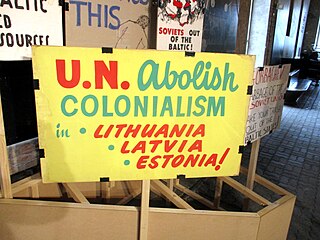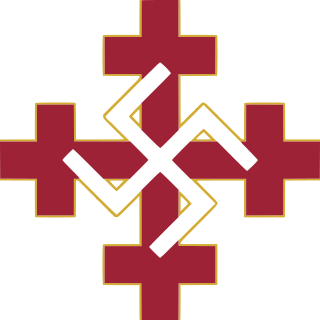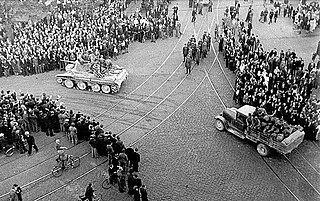Related Research Articles

Dievturība is a modern continuation of the ethnic religion of the Latvians from what it was before Christianization in the 13th century. Adherents call themselves Dievturi, literally "Dievs' keepers", "people who live in harmony with Dievs". The movement is mainly based on Latvian folklore, folk songs and Latvian mythology.

Swedish Livonia was a dominion of the Swedish Empire from 1629 until 1721. The territory, which constituted the southern part of modern Estonia and the northern part of modern Latvia, represented the conquest of the major part of the Polish-Lithuanian Duchy of Livonia during the 1600–1629 Polish-Swedish War. Parts of Livonia and the city of Riga were under Swedish control as early as 1621 and the situation was formalized in the Truce of Altmark 1629, but the whole territory was not ceded formally until the Treaty of Oliva in 1660. The minority part of the Wenden Voivodeship retained by the Polish–Lithuanian Commonwealth was renamed the Inflanty Voivodeship, which today corresponds to the Latgale region of Latvia.

The three independent Baltic countries – Estonia, Latvia, and Lithuania – were invaded and occupied in June 1940 by the Soviet Union, under the leadership of Stalin and auspices of the Molotov–Ribbentrop Pact that had been signed between Nazi Germany and the Soviet Union in August 1939, immediately before the outbreak of World War II. The three countries were then annexed into the Soviet Union in August 1940. The United States and most other Western countries never recognised this incorporation, considering it illegal. On 22 June 1941, Nazi Germany attacked the Soviet Union and within weeks occupied the Baltic territories. In July 1941, the Third Reich incorporated the Baltic territory into its Reichskommissariat Ostland. As a result of the Red Army's Baltic Offensive of 1944, the Soviet Union recaptured most of the Baltic states and trapped the remaining German forces in the Courland Pocket until their formal surrender in May 1945.

Pērkonkrusts was a Latvian ultranationalist, anti-German, anti-Slavic, and antisemitic political party founded in 1933 by Gustavs Celmiņš, borrowing elements of German nationalism—but being unsympathetic to Nazism at the time—and Italian Fascism. It was outlawed in 1934, its leadership arrested, and Celmiņš eventually exiled in 1937. Still-imprisoned members were persecuted under the first Soviet occupation; some collaborated with subsequently invading Nazi Germany forces in perpetrating the Holocaust. Pērkonkrusts continued to exist in some form until 1944, when Celmiņš, who had initially returned to work in the occupying German administration, was imprisoned.

Latgalians were an ancient Baltic tribe.

The Duchy of Livonia, also referred to as Polish Livonia or Livonia, was a territory of the Grand Duchy of Lithuania and later the Polish–Lithuanian Commonwealth that existed from 1561 to 1621. It corresponds to the present-day areas of northern Latvia and southern Estonia.

Otepää is a town in Valga County, southern Estonia. It is the administrative centre of Otepää Parish. Otepää is a popular skiing resort, popularly known as the "winter capital" of Estonia. During the 2005–2006 season it became the site for FIS Cross-Country World Cup events. Otepää is located the highest of the Estonian cities, up to 152 meters above sea level.

The Latvian Socialist Soviet Republic was a short-lived socialist republic formed during the Latvian War of Independence. It was proclaimed on 17 December 1918 with the political, economic, and military backing of Vladimir Lenin and his Bolshevik government in the Russian SFSR. The head of government was Pēteris Stučka with Jūlijs Daniševskis as his deputy.

The Soviet occupation of Latvia in 1940 refers to the military occupation of the Republic of Latvia by the Soviet Union under the provisions of the 1939 Molotov–Ribbentrop Pact with Nazi Germany and its Secret Additional Protocol signed in August 1939. The occupation took place according to the European Court of Human Rights, the Government of Latvia, the United States Department of State, and the European Union. In 1989, the USSR also condemned the 1939 secret protocol between Nazi Germany and herself that had led to the invasion and occupation of the three Baltic countries, including Latvia.
Diena is a Latvian language national daily newspaper in Latvia, published since 23 November 1990. It is one of Latvia's largest daily periodicals and used to be considered as a paper of record.

The Soviet re-occupation of Latvia in 1944 refers to the military occupation of Latvia by the Soviet Union in 1944. During World War II Latvia was first occupied by the Soviet Union in June 1940, then was occupied by Nazi Germany in 1941–1944, and after which it was re-occupied by the Soviet Union.

The Soviet occupation of the Baltic states covers the period from the Soviet–Baltic mutual assistance pacts in 1939, to their invasion and annexation in 1940, to the mass deportations of 1941.
This is a timeline of Latvian history, comprising important legal and territorial changes and political events in Latvia and its predecessor states. To read about the background to these events, see History of Latvia. See also the list of presidents of Latvia.

The guerrilla war in the Baltic states was an insurgency waged by Baltic partisans against the Soviet Union from 1944 to 1956. Known alternatively as the "Forest Brothers", the "Brothers of the Wood" and the "Forest Friars", these partisans fought against invading Soviet forces during their occupation of the Baltic states during and after World War II. Similar insurgent groups resisted Soviet occupations in Bulgaria, Poland, Romania and Ukraine.

The Latvian Provisional Government was formed on November 18, 1918 by the People's Council of Latvia as the interim government of the newly-proclaimed Republic of Latvia during the Latvian War of Independence. The term encompasses three cabinets led by Kārlis Ulmanis, the leader of the Agrarian Union, who was chosen to be Prime Minister. The Ulmanis' government led the country until the formation of an elected cabinet after the elections to the Constitutional Assembly of Latvia in June 1920.

Fricis Bārda was a Latvian poet, particularly noted for his interest in philosophical and pantheistic themes.

Terra Mariana was the official name for Medieval Livonia or Old Livonia. It was formed in the aftermath of the Livonian Crusade, and its territories were composed of present-day Estonia and Latvia. It was established on 2 February 1207, as a principality of the Holy Roman Empire, and lost this status in 1215 when Pope Innocent III proclaimed it as directly subject to the Holy See.

Ināra Mūrniece is a Latvian journalist, politician and a member of Saeima. She was Speaker of the Saeima from 2014 to 2022. In 2022, she was succeeded in that role by Edvards Smiltēns.

Anšlavs Eglītis was a Latvian writer, journalist and painter who became a war refugee in 1944. He had a prolific career as a novelist, and his later work often examined aspects of exile life.
Arvīds Brastiņš was a Latvian sculptor, writer and neopagan leader. He was educated at the Saint Petersburg Stieglitz State Academy of Art and Design and began to exhibit his folklore-inspired sculptures in 1918. He worked as a schoolteacher and was active as a writer, writing about Latvian folklore and publishing collections of folksongs. Brastiņš was the brother of Ernests Brastiņš who founded the Baltic neopagan movement Dievturība in the 1920s. Both brothers became major intellectual leaders within this movement. Resettled in the United States after the Soviet occupation of Latvia, Arvīds Brastiņš led an émigré continuation of the movement until his death.
References
- ↑ ""Experiencing Totalitarianism" by Andrejs Plakans". www2.mfa.gov.lv.
- ↑ "Historical Dictionary of Latvia (Historical Dictionaries of Europe #60) (Hardcover) | Kepler's Books". www.keplers.com.
- ↑ Bartlett, Roger (March 1, 2012). "Book Review: Andrejs Plakans: A Concise History of the Baltic States". Journal of European Studies . 42 (1): 78–80. doi:10.1177/0047244111428848b. S2CID 162349981 – via SAGE Journals.
- ↑ "The Latvians: A Short History". Hoover Institution.
- ↑ Kertzer, David I. (September 1, 1986). "Kinship in the Past: An Anthropology of European Family Life, 1500-1900. Andrejs Plakans". American Journal of Sociology . 92 (2): 508–510. doi:10.1086/228535 – via journals.uchicago.edu (Atypon).
- ↑ Plakans, Andrejs (May 25, 2021). The Reluctant Exiles: Latvians in the West after World War II. Brill Schöningh. ISBN 9783657760282 – via brill.com.
- ↑ Family History at the Crossroads. March 21, 2017. ISBN 9780691608709 – via press.princeton.edu.